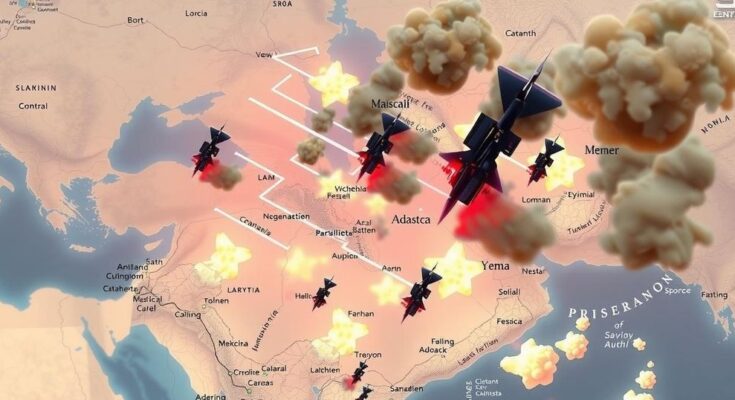Israel has bombed Yemen’s airport and port city, prompting Houthi missiles to be fired at Tel Aviv. Prime Minister Netanyahu indicates further military actions, escalating the existing hostilities. This situation raises significant concerns about regional stability and the potential for a wider conflict.
The recent escalation of hostilities between Israel and Yemen marks a troubling chapter in Middle Eastern geopolitics. Israel has intensified its military operations by targeting strategic locations in Yemen, including key infrastructure such as the main airport and port city. Prime Minister Benjamin Netanyahu has indicated that further military actions are anticipated. In retaliation, the Houthis launched a missile towards Tel Aviv, underscoring the threat of a broader conflict in the region. This cycle of aggression raises critical concerns about regional stability and the possibility of an extended confrontation.
The situation in Yemen has already been precarious due to years of civil war and humanitarian crises. The involvement of Israel not only complicates the existing dynamics but also introduces new international tensions. Key figures analyzing this conflict, such as Mustapha Noman and Yossi Beilin, emphasize the potential ramifications of this increased military engagement, which could draw in external powers and disrupt any prospects for peace and reconciliation in a war-torn Yemen.
Yemen has been embroiled in a devastating civil war since 2015, primarily between the Houthis, who control significant parts of the country, and the internationally recognized government. Israel’s motives for attacking Yemen appear rooted in concerns over Iranian influence in the region, as the Houthi movement is often supported by Iran. The recent airstrikes represent a significant escalation not only in the conflict between Israel and the Houthis but also hint at a broader clash involving regional and global powers, raising alarms among analysts and policymakers. The implications of these developments may reshape alliances and conflicts throughout the Middle East.
The implications of the latest Israeli attacks on Yemen are profound and far-reaching, highlighting the fragility of peace in the region. The retaliatory missile strike by the Houthis on Tel Aviv illustrates the potential for increased violence and draws attention to the interconnected nature of Middle Eastern conflicts. Stakeholders emphasize the urgent need for diplomatic dialogue to prevent further escalation and address the humanitarian issues facing Yemen. The ongoing cycle of violence undeniably threatens both local and international stability, necessitating immediate and concerted action from the international community.
Original Source: www.aljazeera.com




